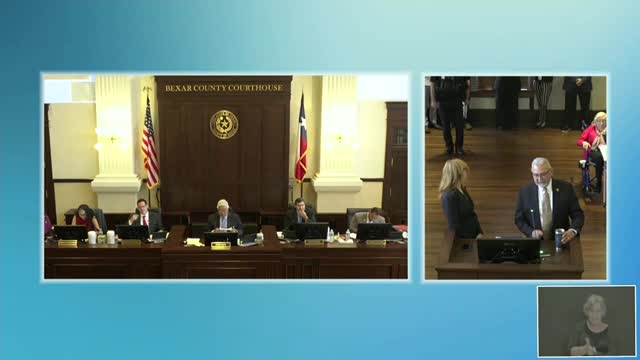Bexar County officials address prosecutor pay and University Health tax rate
August 05, 2025 | Bexar County, Texas
This article was created by AI summarizing key points discussed. AI makes mistakes, so for full details and context, please refer to the video of the full meeting. Please report any errors so we can fix them. Report an error »

Bexar County's Commissioners Court took significant steps to address the ongoing challenges in the local legal system during their recent meeting on August 5, 2025. A key focus was the alarming trend of prosecutors leaving the district attorney's office for better-paying positions in the public defender's office. This issue highlights a broader national concern regarding recruitment and retention in legal professions.
During the meeting, it was revealed that a recent departure involved a prosecutor who transitioned to the public defender's office, where he would earn $86,000 compared to the $78,000 offered by the district attorney's office. This disparity in salaries has raised concerns among commissioners, with Commissioner Moody expressing disbelief that the county is losing talent to competing offices due to financial incentives.
The discussion also touched on the effectiveness of a high-risk program that has seen over 5,000 hours of prosecutor involvement, emphasizing the human aspect of legal work and the need for systemic improvements. The district attorney's office has previously received support for salary increases, but officials indicated that these adjustments have not kept pace with market demands.
In response to these challenges, the court discussed the innovative use of unexpended salary funds by the district attorney to address pressing needs within the office without requiring new tax dollars. Constable Vavadich voiced support for this approach, underscoring the importance of flexibility in budget management to enhance operational efficiency.
Additionally, the court reviewed the proposed ad valorem tax rate recommendation for the Bexar County Hospital District, which is set to remain unchanged. This decision reflects ongoing efforts to maximize homestead exemptions for residents, ensuring continued support for community health initiatives.
As Bexar County navigates these complex issues, the decisions made in this meeting are expected to have lasting implications for the local legal system and public health services, highlighting the need for continued dialogue and strategic planning to meet community needs effectively.
During the meeting, it was revealed that a recent departure involved a prosecutor who transitioned to the public defender's office, where he would earn $86,000 compared to the $78,000 offered by the district attorney's office. This disparity in salaries has raised concerns among commissioners, with Commissioner Moody expressing disbelief that the county is losing talent to competing offices due to financial incentives.
The discussion also touched on the effectiveness of a high-risk program that has seen over 5,000 hours of prosecutor involvement, emphasizing the human aspect of legal work and the need for systemic improvements. The district attorney's office has previously received support for salary increases, but officials indicated that these adjustments have not kept pace with market demands.
In response to these challenges, the court discussed the innovative use of unexpended salary funds by the district attorney to address pressing needs within the office without requiring new tax dollars. Constable Vavadich voiced support for this approach, underscoring the importance of flexibility in budget management to enhance operational efficiency.
Additionally, the court reviewed the proposed ad valorem tax rate recommendation for the Bexar County Hospital District, which is set to remain unchanged. This decision reflects ongoing efforts to maximize homestead exemptions for residents, ensuring continued support for community health initiatives.
As Bexar County navigates these complex issues, the decisions made in this meeting are expected to have lasting implications for the local legal system and public health services, highlighting the need for continued dialogue and strategic planning to meet community needs effectively.
View full meeting
This article is based on a recent meeting—watch the full video and explore the complete transcript for deeper insights into the discussion.
View full meeting
